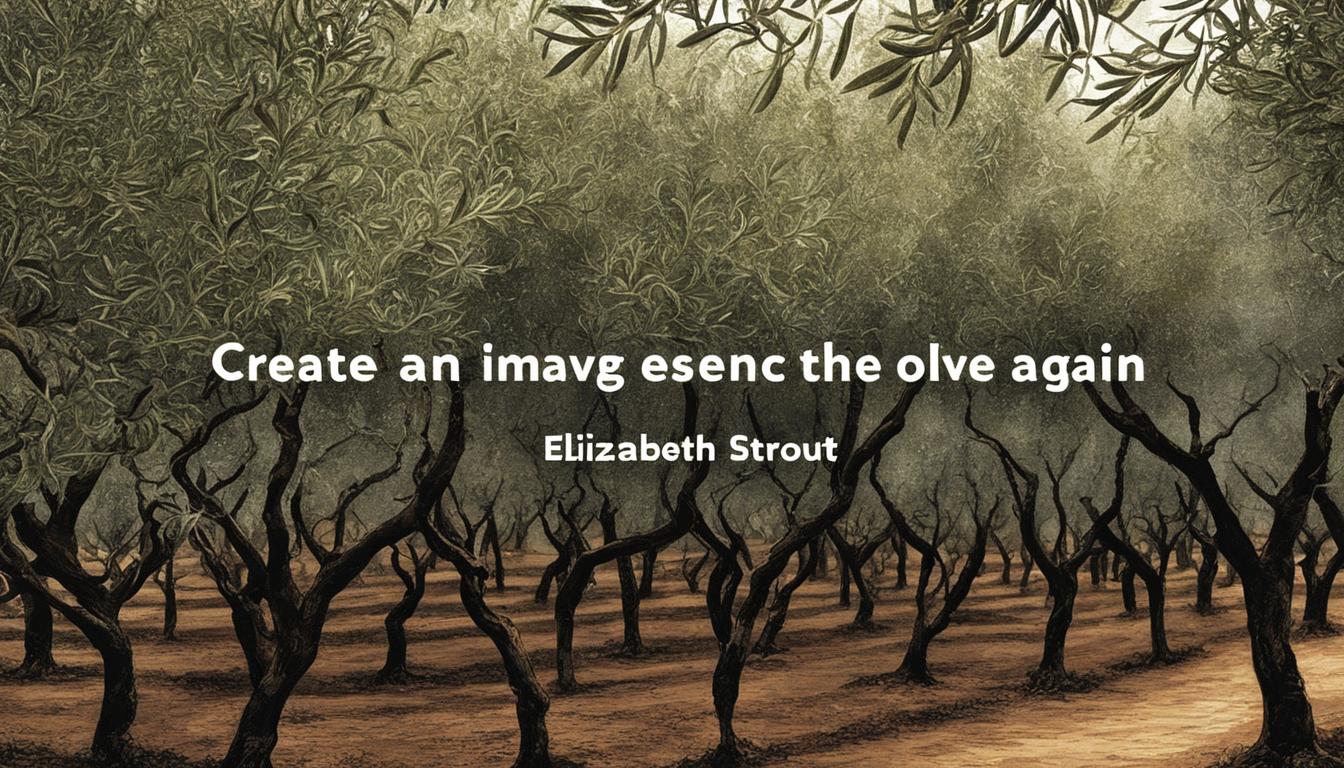If you’re on the lookout for a captivating audiobook, “Olive, Again” by Elizabeth Strout is definitely worth your attention. This highly acclaimed sequel is the perfect follow-up to her award-winning novel “Olive Kitteridge”, picking up where the first installment left off.
With her unique writing style and profound insights into human nature, Elizabeth Strout creates an unforgettable story of life and love in small-town America. Whether you’re a fan of the author or simply looking for a poignant and entertaining listen, “Olive, Again” is sure to satisfy your appetite for exceptional audiobooks.
In this review, we’ll explore the key features of “Olive, Again,” including its characters, themes, narrative style, emotional impact, and more. We’ll also provide an in-depth analysis of the audiobook version and discuss how it compares to the original novel. Stay tuned for our recommendations and final verdict.
About Elizabeth Strout
Elizabeth Strout is an acclaimed American author known for her poignant and character-driven novels. She was born in Portland, Maine, in 1956 and grew up in small towns in Maine and New Hampshire. Strout graduated from Bates College in 1977 and later earned a law degree from Syracuse University. After practicing law for several years, she turned to writing and has since produced multiple best-selling novels.
Some of Strout’s most notable works include Olive Kitteridge, which won the 2009 Pulitzer Prize for Fiction and was later adapted into a critically acclaimed HBO miniseries starring Frances McDormand. She has also written other popular novels such as My Name Is Lucy Barton, The Burgess Boys, and Amy and Isabelle.
| Birthdate | Occupation | Notable Awards and Recognition |
|---|---|---|
| January 6, 1956 | Author | Pulitzer Prize for Fiction, Man Booker Prize longlist, Steinbeck Award, and more |
Strout’s writing has been praised for its tender insight and honest portrayal of complex human relationships. She often explores themes of family, love, loss, and loneliness in her work, and her characters are known for their depth and emotional complexity. Her novels have been translated into over 40 languages and have won numerous awards and critical acclaim.
Early Life and Education
Elizabeth Strout was born on January 6, 1956, in Portland, Maine. She spent much of her childhood in small towns in Maine and New Hampshire, and her experiences growing up in these areas would later inform her writing. She attended Bates College in Lewiston, Maine, where she earned a degree in English in 1977. She later went on to earn a law degree from Syracuse University and practiced law for several years before turning to writing full-time in the 1990s.
Writing Career
Elizabeth Strout’s writing career began in the 1990s with the publication of her first novel, Amy and Isabelle, which was well-received by critics and readers. She followed this up with several more novels, including Abide with Me and The Burgess Boys. But it was her 2008 novel Olive Kitteridge that really brought her widespread recognition and acclaim. The novel tells the story of a retired schoolteacher in a small town in Maine and the various people whose lives intersect with hers. It won the Pulitzer Prize for Fiction and was later adapted into a successful HBO miniseries starring Frances McDormand.
Since then, Strout has continued to write novels that explore similar themes of family, love, and loss. Her most recent novel, Olive, Again, is a sequel to Olive Kitteridge and follows the same character as she navigates old age and new relationships.
Throughout her career, Strout’s writing has been characterized by its emotional resonance and careful attention to detail. She has a gift for creating complex, fully-realized characters and exploring the small moments that make up their lives. Her work has been widely praised for its tenderness, insight, and depth of feeling, and she is considered one of America’s finest contemporary writers.
Synopsis of “Olive, Again”
Elizabeth Strout’s “Olive, Again” is a captivating sequel that brings back the beloved character Olive Kitteridge. The novel follows Olive as she navigates the ups and downs of life in her small Maine town, addressing themes such as aging, marriage, and family.
The book is divided into interconnected stories, each focusing on different characters and their experiences with Olive. The audiobook version, narrated by Kimberly Farr, brings these characters to life and allows listeners to fully immerse themselves in the world of Crosby, Maine.
| Key Themes |
|---|
| 1. Aging and mortality |
| 2. Family relationships |
| 3. Love and marriage |
| 4. Small town dynamics |
| 5. Isolation and connection |
Overall, “Olive, Again” is a poignant and thought-provoking novel that explores the complexities of human relationships and the inevitability of change. Whether you’re a long-time fan of Elizabeth Strout or a newcomer to her work, “Olive, Again” is a must-read/listen that is sure to leave a lasting impression.
Characters in “Olive, Again”
Elizabeth Strout’s “Olive, Again” is a beautifully crafted novel featuring a diverse cast of characters. The protagonist, Olive Kitteridge, is a complex character whose evolution throughout the book is fascinating to observe.
Many of the other characters in the novel, such as Jack Kennison, Cindy Kitzmiller, and Christopher Kitteridge, are closely intertwined with Olive and play significant roles in her life. Each character is developed in a nuanced way, with their own unique personality traits and motivations.

Their interactions with one another are layered and multidimensional, contributing to the intricate web of relationships that make up the heart of the novel. Strout masterfully weaves together these various character arcs, creating a rich and complex tapestry of human experience.
Overall, the characters in “Olive, Again” are deeply human and relatable, each with their own flaws and strengths. Their stories are told with empathy and understanding, offering readers a glimpse into the complexities of the human condition.
Writing Style and Narrative
Elizabeth Strout’s writing style in “Olive, Again” offers a unique blend of honesty, tenderness, and wit. Through her masterful use of prose, she paints a vivid picture of small-town life and human relationships that is both engaging and thought-provoking. Her descriptive language allows readers to fully immerse themselves in the story and connect deeply with the characters.
The narrative structure of the audiobook is also notable. “Olive, Again” is comprised of interconnected stories that follow the life of Olive Kitteridge, a retired schoolteacher living in the sleepy town of Crosby, Maine. Each story provides a glimpse into Olive’s world and the lives of those around her, creating a rich tapestry of human experience that is both insightful and moving.
The use of multiple narrators also adds depth and variety to the audiobook. Each section of the book is narrated by a different actor, giving voice to the diverse range of characters and perspectives. This creates a dynamic listening experience that further emphasizes the richness of the story.
Overall, Elizabeth Strout’s writing style and narrative structure in “Olive, Again” create a truly unforgettable listening experience that is both heartwarming and thought-provoking.
Theme Exploration
The themes explored in “Olive, Again” are rich and thought-provoking, resonating deeply with contemporary society. One dominant theme is the process of aging and its associated challenges, such as loneliness, regret, and deteriorating health. Olive herself embodies these struggles, facing them head-on with her characteristic stubbornness and resilience.
Another theme is the complexity of human relationships, particularly within families. Through Olive’s interactions with her son, ex-husband, and friends, Strout delves into the nuances of love, forgiveness, and acceptance. These relationships are often messy and complicated, yet still manage to offer glimpses of hope and redemption.
Yet another theme explored in “Olive, Again” is the impact of trauma on individuals and communities. Strout tackles difficult subjects such as addiction, suicide, and domestic violence, painting a realistic and empathetic portrait of the fallout that these experiences can have on people’s lives.
Coupled with Strout’s masterful prose and poignant storytelling, these themes make “Olive, Again” a must-read for anyone looking to explore the complexities of the human experience.
Emotional Impact
“Olive, Again” by Elizabeth Strout is a poignant and moving audiobook that elicits a range of emotions from its listeners. Through the vivid and realistic characters and their relatable struggles, Strout creates a sense of empathy that tugs at the heartstrings. The audiobook’s themes of love, loss, and resilience are powerfully portrayed and leave a lasting impact.
The narrator’s performance adds another layer of emotional depth to the audiobook, bringing the characters and their stories to life in a way that is both captivating and heart-wrenching. The use of descriptive language and vivid imagery also contributes to the emotional impact of the audiobook, making the listener feel fully immersed in the world of Olive Kitteridge and her community.

The Power of Empathy
One of the most striking elements of “Olive, Again” is the power of empathy that it inspires in its listeners. By exploring the complexities of human relationships and the challenges we face in life, Strout creates characters that feel like real people and situations that feel all too familiar. Through their struggles, we are able to see ourselves and our own experiences reflected back at us, fostering a deeper connection and understanding of our own emotions.
The Value of Resilience
Another key theme of “Olive, Again” is the value of resilience, even in the face of adversity. Through the character of Olive Kitteridge, Strout portrays a woman who has faced numerous challenges and hardships but continues to persevere and find meaning in her life. This message is particularly poignant in today’s world, where resilience and optimism are needed more than ever.
Audiobook Narration
The narration of an audiobook can greatly impact the listening experience, and “Olive, Again” is no exception. Narrated by Kimberly Farr, the audiobook version of Elizabeth Strout’s novel brings the characters and stories to life through immersive narration.
Farr’s careful intonation and inflection capture the essence of each character, allowing the listener to fully engage with the emotional depth of the novel. Her nuanced performance creates a deeply moving experience for the audience, adding a new layer of complexity to Strout’s already masterful storytelling.
If you’re looking for an audiobook that will transport you to another world, “Olive, Again” narrated by Kimberly Farr is a great choice.
Critical Reception
The audiobook “Olive, Again” by Elizabeth Strout has received critical acclaim for its exploration of the complexities of human relationships and the portrayal of the flawed yet relatable character of Olive Kitteridge. The sequel to the Pulitzer Prize-winning novel “Olive Kitteridge” has been praised for its poignant storytelling and impactful themes.
According to The New York Times, “‘Olive, Again’ is sophisticated and thought-provoking, yet at the same time eminently readable.” Acclaimed author Stephen King also praised the book, calling it “a novel to treasure.”
Readers have similarly lauded “Olive, Again” for its captivating narrative and emotional depth. On Goodreads, the book has an average rating of 4 out of 5 stars, with reviewers praising its realistic portrayal of human relationships and character development.
The critical reception of “Olive, Again” highlights the success of Elizabeth Strout in capturing the complexities of human experiences through her writing.
Comparison to the First Installment
Many fans of Elizabeth Strout were eager to read “Olive, Again,” the sequel to her popular book “Olive Kitteridge.” In terms of similarities, both books feature the same titular character, Olive, and are set in the small town of Crosby, Maine. However, each book can stand alone as an independent story.
One major difference between the two books is the structure. “Olive, Again” is a collection of connected short stories, while “Olive Kitteridge” is a novel. This allows readers to delve deeper into Olive’s character development and explore different facets of her life, making it an ideal choice for those who enjoy character-driven fiction.
That being said, “Olive Kitteridge” won the Pulitzer Prize for Fiction in 2009, while “Olive, Again” was a finalist for the same award in 2020. This suggests that both are highly acclaimed and successful books in their own right.
Comparison Table
| Comparison | “Olive, Again” | “Olive Kitteridge” |
|---|---|---|
| Book Structure | Collection of connected short stories | Novel |
| Awards | Finalist for the Pulitzer Prize for Fiction (2020) | Pulitzer Prize for Fiction (2009) |
| Setting | Small town of Crosby, Maine | Small town of Crosby, Maine |
| Main Character | Olive Kitteridge | Olive Kitteridge |
Overall, “Olive, Again” successfully continues the story of Olive Kitteridge and provides a fresh perspective on her character. While some readers may prefer the structure of the first installment, both books are highly acclaimed and worth reading for fans of Elizabeth Strout’s writing.
Impact and Significance
Since its publication, “Olive, Again” by Elizabeth Strout has made a significant impact on the literary world. The book has been praised for its poignant and relatable portrayal of its characters, as well as its exploration of universal themes such as aging, love, and forgiveness.
The significance of “Olive, Again” is also evident in its critical acclaim. The novel was a finalist for the Pulitzer Prize in Fiction and was named one of the best books of 2019 by publications such as Time, The Washington Post, and The New York Times Book Review.
Furthermore, “Olive, Again” has cemented Strout’s reputation as a master of the genre. Her ability to craft compelling and emotionally resonant stories has earned her numerous awards and accolades, including the Pulitzer Prize for her previous novel, “Olive Kitteridge.”
Overall, the impact and significance of “Olive, Again” cannot be overstated. Its thoughtful exploration of the complexities of human relationships and its examination of the joys and struggles of everyday life have resonated with readers around the world, cementing its status as a modern classic.
Recommendations for Listeners
For those who enjoy character-driven stories with a strong sense of place and a mix of humor and poignancy, “Olive, Again” is a highly recommended listen. Elizabeth Strout’s writing is both intricate and accessible, making for a satisfying and immersive experience.
The audiobook narration by Kimberly Farr is top-notch, capturing the unique voice and personality of Olive Kitteridge and the other memorable characters in the novel. Farr’s distinctive inflection and expert pacing bring additional depth and nuance to the story.
Listeners who enjoyed the first installment, “Olive Kitteridge,” will appreciate returning to the familiar setting of Crosby, Maine and reconnecting with the beloved protagonist. However, “Olive, Again” can also be enjoyed as a standalone novel, as Strout deftly weaves in references and backstory for new readers.
Overall, “Olive, Again” is a thoughtful and engaging novel that rewards careful listening. It is recommended for anyone looking for a moving and nuanced exploration of human relationships and the complexities of life.
Conclusion
Overall, “Olive, Again” by Elizabeth Strout is a beautifully written and emotionally resonant audiobook that is well worth the listen for fans of literary fiction. The book explores complex themes and features a cast of memorable characters, brought to life by the talented narration of Kimberly Farr.
While the book may not be for everyone, those who appreciate introspective and character-driven stories will likely find “Olive, Again” to be a rewarding listen. The audiobook is particularly well-suited for listeners who enjoy a slower pace and a more contemplative tone.
As an audiobook, “Olive, Again” is expertly crafted and engaging, making for a thoroughly enjoyable listening experience. Whether you’re a fan of Elizabeth Strout’s previous works or are simply looking for a compelling new audiobook to add to your collection, “Olive, Again” is well worth your consideration.
Overall, this audiobook review recommends “Olive, Again” as a must-listen for fans of contemporary literary fiction looking for a thoughtful and rewarding listening experience.
FAQ
What is the audiobook review for “Olive, Again” by Elizabeth Strout?
The audiobook review for “Olive, Again” by Elizabeth Strout is a comprehensive analysis and evaluation of the audiobook version of the novel. It provides insights into the narration, writing style, character development, and emotional impact of the story.
Who is Elizabeth Strout?
Elizabeth Strout is a renowned contemporary American author known for her critically acclaimed works of fiction. She has received several awards and accolades, including the Pulitzer Prize for Fiction for her novel “Olive Kitteridge.”
What is the synopsis of “Olive, Again”?
“Olive, Again” is a sequel to Elizabeth Strout’s novel “Olive Kitteridge.” It follows the life of Olive Kitteridge, a complex and compelling character, as she navigates through various stages of her life, exploring themes of love, loss, forgiveness, and the complexities of human relationships.
Who are the main characters in “Olive, Again”?
Some of the main characters in “Olive, Again” include Olive Kitteridge, Jack Kennison, Cindy Kitzmiller, Ann Kitteridge, and many others. Each character contributes to the overall development of the story and offers unique perspectives on life’s challenges.
What is the writing style and narrative of “Olive, Again” like?
Elizabeth Strout’s writing style in “Olive, Again” is characterized by its introspective and compassionate tone. The narrative is presented through a series of interconnected stories and vignettes, providing a nuanced and intimate exploration of the characters’ lives.
What are the themes explored in “Olive, Again”?
“Olive, Again” explores several themes, including aging, loneliness, family dynamics, redemption, and the search for meaning and connection in life. These themes resonate with readers and offer profound insights into the human condition.
How does “Olive, Again” elicit emotional responses from listeners?
“Olive, Again” evokes a wide range of emotions in listeners, including empathy, nostalgia, and introspection. Elizabeth Strout’s poignant storytelling and vivid character portrayals allow listeners to deeply connect with the experiences and emotions depicted in the audiobook.
What is the narration like in the audiobook version of “Olive, Again”?
The audiobook version of “Olive, Again” features skilled narration that brings the characters and their stories to life. The narrator’s tone and delivery enhance the listening experience, allowing listeners to fully immerse themselves in the narrative.
How has “Olive, Again” been received by critics and readers?
“Olive, Again” has received widespread critical acclaim, with many praising Elizabeth Strout’s masterful storytelling and rich character development. Readers have also expressed their admiration for the emotional depth and resonance of the novel.
How does “Olive, Again” compare to its predecessor, “Olive Kitteridge”?
“Olive, Again” builds upon the foundation laid by its predecessor, delving deeper into the complexities of Olive Kitteridge’s life and the lives of those around her. While both novels share common themes and characters, “Olive, Again” offers a fresh perspective and further explores the evolving dynamics of relationships.
What is the impact and significance of “Olive, Again” in the literary world?
“Olive, Again” has made a significant impact in the literary world, solidifying Elizabeth Strout’s reputation as a master storyteller. The novel has sparked conversations about aging, relationships, and the human experience, cementing its place as a modern literary classic.
Who would enjoy “Olive, Again” as an audiobook?
Fans of Elizabeth Strout’s previous works, as well as those who appreciate introspective and character-driven narratives, will likely enjoy “Olive, Again” as an audiobook. It is a compelling choice for listeners who appreciate stories that delve into the complexities of human nature and relationships.



